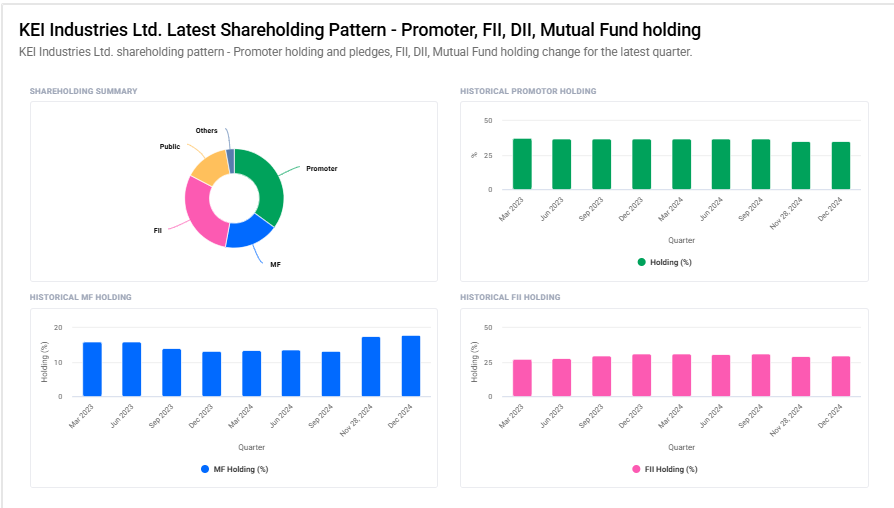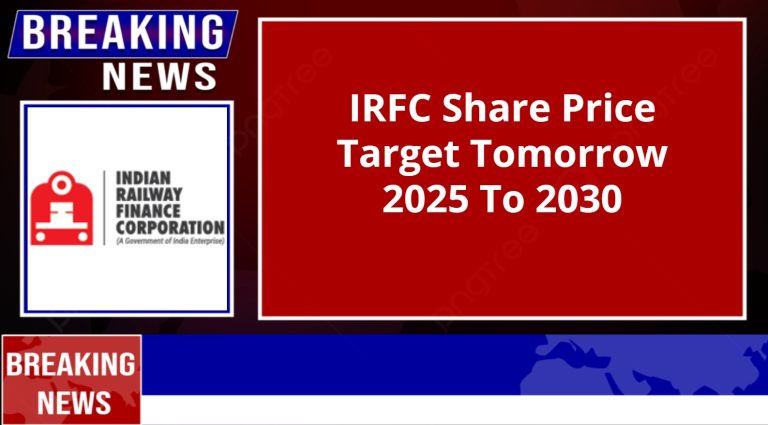KEI Industries Share Price Target Tomorrow 2025 To 2030
KEI Industries is a leading company in the wires and cables industry, supplying power cables, control cables, and stainless steel wires for various sectors like infrastructure, real estate, and power distribution. The company’s strong market presence, growing exports, and expanding dealer network contribute to its stock performance. KEI’s share price is influenced by demand from government and private projects, raw material costs, and overall economic conditions. KEI Industries Share Price on NSE as of 28 March 2025 is 2,917.75 INR.
Current Market overview of KEI Industries Share Price
- Open: 2,904.65
- High: 2,944.95
- Low: 2,901.00
- Previous Close: 2,883.25
- Volume: 432,341
- Value (Lacs): 12,638.41
- VWAP: 2,922.79
- Mkt Cap (Rs. Cr.): 27,932
- Face Value: 2
- UC Limit: 3,171.55
- LC Limit: 2,594.95
- 52 Week High: 5,039.70
- 52 Week Low: 2,762.25
KEI Industries Share Price Target Tomorrow 2025 To 2030
| KEI Industries Share Price Target Years | KEI Industries Share Price |
| 2025 | INR 5040 |
| 2026 | INR 5958 |
| 2027 | INR 6860 |
| 2028 | INR 7790 |
| 2029 | INR 8940 |
| 2030 | INR 9870 |
KEI Industries Share Price Chart

KEI Industries Shareholding Pattern
- Promoter: 35%
- FII: 29.8%
- DII: 20.7%
- Public: 14.5%

Key Factors Affecting KEI Industries Share Price Growth
-
Strong Demand for Wires & Cables
KEI Industries benefits from the rising demand for power cables and wires due to infrastructure development, real estate growth, and industrial expansion. Increased investments in these sectors can boost the company’s revenue and share price. -
Government Infrastructure Projects
The Indian government’s focus on electrification, smart cities, metro projects, and power distribution strengthens KEI’s growth prospects. More projects mean higher demand for KEI’s products, positively impacting its stock performance. -
Expansion in Retail and Exports
KEI has been expanding its retail business and exports, leading to a diversified revenue stream. A strong presence in international markets reduces dependency on domestic demand, supporting long-term share price growth. -
Steady Financial Performance
Consistent revenue growth, healthy profit margins, and strong order books reflect KEI’s solid financial position. Investors prefer companies with stable financials, which can lead to higher stock valuations over time. -
Rising Renewable Energy Investments
As solar and wind energy projects increase, the demand for specialized cables grows. KEI’s involvement in the renewable energy sector strengthens its business potential, enhancing investor confidence. -
Raw Material Price Stability
KEI relies on copper and aluminum for its cables. If raw material prices remain stable or decline, the company can maintain profitability, which positively affects its share price. -
Market Competition and Brand Strength
A strong brand and distribution network help KEI compete effectively in the market. If the company continues to expand its market share while maintaining product quality, its stock is likely to see steady growth.
Risks and Challenges for KEI Industries Share Price
-
Fluctuating Raw Material Prices
KEI Industries depends heavily on copper and aluminum for its cables. Any sharp rise in the prices of these raw materials can increase costs and reduce profit margins, which may negatively impact the share price. -
Intense Market Competition
The wires and cables industry is highly competitive, with strong players like Polycab and Havells. If KEI fails to maintain its market share or pricing power, its revenue growth and stock performance may be affected. -
Slowdown in Infrastructure and Real Estate
KEI’s business is closely linked to infrastructure and real estate projects. Any slowdown in these sectors due to economic downturns, policy delays, or reduced government spending can impact its revenue and stock price. -
Dependence on Government Projects
A significant portion of KEI’s business comes from government contracts. Delays in project approvals, policy changes, or budget cuts in infrastructure spending can affect order flow and, in turn, impact the company’s financials and share price. -
Global Economic Uncertainty
KEI has been expanding its exports, but global economic slowdowns, trade restrictions, or currency fluctuations can affect its international sales and overall profitability, creating pressure on stock performance. -
Debt and Financial Management Risks
If KEI takes on excessive debt to fund expansion or fails to manage its working capital efficiently, it may face financial stress. High interest costs and liquidity issues can negatively impact investor sentiment and share price. -
Technological and Industry Changes
Advancements in electrical technologies or alternative products could reduce demand for traditional cables. If KEI does not adapt to industry shifts or invest in innovation, it may lose competitiveness, affecting its long-term stock growth.
Read Also:- AWL Share Price Target Tomorrow 2025 To 2030







